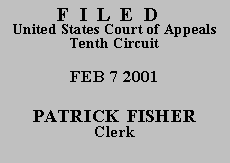

| SONNY LAUREN HARMON,
vs.
GLYNN BOOHER, Warden |
|
Mr. Harmon was convicted of operation of a chop shop, possession of a motor vehicle with altered VIN number, and conspiracy to operate a chop shop, all after former conviction of two or more felonies, and sentenced to twenty-year concurrent terms. The judgments and sentences were entered February 7, 1992, but did not reflect the former conviction of two or more felonies, which would result in Mr. Harmon's ineligibility for "emergency time credits." Okla. Stat. Ann. tit. 57, § 573 (West 1991). The judgments were amended on December 3, 1993, but Mr. Harmon continued to receive the credits for years thereafter. He contends that he was not aware of the factual predicate of his habeas claim until February 10, 1998, when he received notice of the removal of the credits. See 28 U.S.C. § 2244(d)(1)(D). Even making the dubious assumption that this assertion is correct, his current federal petition, filed March 6, 2000, is time barred.
Mr. Harmon filed a federal habeas petition raising these matters on April 17, 1998. That petition was dismissed without prejudice on October 21, 1998, for failure to exhaust state court remedies. We recently held that a federal habeas petitioner is entitled to toll the period a federal petition is pending before being dismissed without prejudice for failure to exhaust. Petrick v. Martin, ___ F.3d ___, ___ No. 99-6399, 2001 WL 8313, at *5 (10th Cir. Jan. 3, 2001). Accordingly, Mr. Harmon would be able to toll the approximately six months from April 17 to October 21, 1998.
Mr. Harmon then sought state post-conviction relief on June 15, 1999, R. doc. 13 at 5; the state district court denied relief on June 17, 1999. Mr. Harmon appealed to the Oklahoma Court of Criminal Appeals which affirmed the state district court on September 13, 1999. Accordingly, Mr. Harmon would be entitled to toll approximately three months from June 15, 1999, to September 13, 1999. See 28 U.S.C. § 2244(d)(2). As noted, the instant petition was filed March 6, 2000, almost twenty-five months after the factual predicate for the claim ostensibly became known. Approximately nine months of tolling will not bring this petition within the one-year limitation period. See 28 U.S.C. § 2244(d)(1)(D). Moreover, given Mr. Harmon's unsuccessful challenges to the amended judgments that predated the loss of his emergency time credits, this is hardly a case for equitable tolling.
The motion for leave to proceed without prepayment of fees or costs is denied; the application for a certificate of appealability is denied for want of a substantial showing of the denial of a constitutional right, see 28 U.S.C. § 2253(c)(2); Slack v. McDaniel, 120 S. Ct. 1595, 1603-04 (2000), and the appeal is dismissed.
Entered for the Court
Paul J. Kelly, Jr.
Circuit Judge
*. This order and judgment is not binding precedent, except under the doctrines of law of the case, res judicata, and collateral estoppel. This court generally disfavors the citation of orders and judgments; nevertheless, an order and judgment may be cited under the terms and conditions of 10th Cir. R. 36.3.
2. After examining the briefs and the appellate record, this three-judge panel has determined unanimously that oral argument would not be of material assistance in the determination of this appeal. See Fed. R. App. P. 34(a); 10th Cir. R. 34.1 (G). The cause is therefore ordered submitted without oral argument.